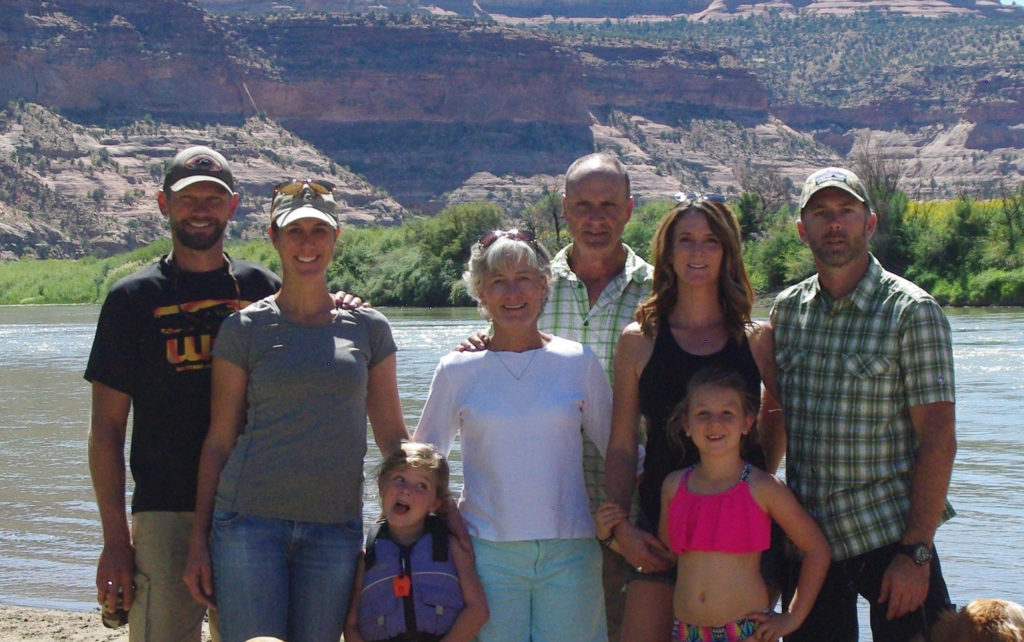When pathology reports from her lung cancer biopsy showed that 56-year-old Karen Peterson was positive for the KRAS oncogene, she had never heard of the KRAS protein before.
Karen and her family turned to the internet, hoping to learn more about the gene’s influence on Karen’s lung cancer diagnosis. Back in 2016, the same evening that the news of Karen’s lung cancer diagnosis broke, her daughters “spent the next several hours researching, and found a lung cancer advocate in Pennsylvania.”
The next morning, Karen’s oldest daughter had arranged a conference call with the advocate, named Donna. Donna’s biggest piece of advice was to seek assistance from Dr. Paul Bunn, a medical oncologist, and lung cancer expert who worked in Denver. While still on the call with Donna, Karen recalled, “my husband and daughters all independently wrote emails to Dr. Bunn.” Thirty minutes later, they received a call from him; forty-eight hours later, Karen and her family traveled the 250 miles to Denver, from their home in Grand Junction, where she received PET and MRI scans, and met with Dr. Bunn to formulate a treatment plan. A week later, Karen underwent her first surgery to remove a six-centimeter tumor in the upper right lobe of her lung. Karen’s family members’ active outreach and support led to a clear and decisive plan following her diagnosis. “Things just fell into the right place at the right time–I’m very fortunate and thankful that I’ve had people surround me,” Karen shared.

Though she stumbled upon MiraKind and connected with Dr. Joanne Weidhaas while researching KRAS at the time of her original diagnosis in the summer of 2016, it wasn’t until December 2017 — when Karen’s doctor found that her tumor had metastasized to her brain — that Karen sent in her saliva sample for KRAS-variant testing. Dr. Weidhaas had explained originally that the KRAS mutation found in her lung tumor did not mean she also had the KRAS-variant, which is a genetic, inherited version of an altered KRAS. But now having treatment decisions to make, Karen knew it was time to find out if she had the KRAS-variant. The results came back positive.
Karen and her family acted fast. Within a month and a half, surgery to remove the 2.5-centimeter tumor in her brain had been performed and three targeted radiation treatments completed. The question then became whether Karen should pursue an aggressive treatment of immunotherapy and chemotherapy, in light of her doctor’s belief that she still had a 50% chance of residual cancer after surgery. In pursuit of the best approach, Karen reached out to Dr. Weidhaas. She advised that Karen seek multiple other opinions and ask these expert doctors “point blank” what they would do if they were in Karen’s shoes. This conversation prompted Karen to reach out to the Director of Oncology at Memorial Sloan Kettering Hospital, to whom she sent all of her medical history and questions. He concluded that Karen would be better off pursuing both treatments, as her doctor had originally recommended. Now, Karen is currently undergoing a course of both chemo and immunotherapy.
“I am so thankful that I found Mirakind and Dr. Joanne Weidhaas,” Karen explained. “She has taken the time out of her busy schedule to always respond to my emails and even called me on a few occasions for guidance and to answer any questions I have.” Karen recalls the time that Joanne answered her phone call as she was going through airport security. It is this kind of support that has been the hallmark of Karen’s battle against cancer. At each fork in the road of her cancer journey, Karen has been surrounded and fiercely supported by her husband, two daughters and other family and friends.
MiraKind has played a large role in improving Karen’s understanding of her own disease as well.
Prior to learning that she was positive for the inherited KRAS-variant, Karen explains, “I always felt that I was doomed.” Her mother was diagnosed with breast cancer at 34-years-old and passed away two short years later after her cancer metastasized to her liver, bones, and uterus. Karen’s maternal grandmother also died of breast cancer at a young age, and her father lost his battle to lung cancer at the age of 58. This family history, along with Karen’s smoking habits at a young age, elevated her concerns about her own cancer risk. At times, she “just assumed” it would happen. Nonetheless, Karen explained, “I went to the doctor every year and did my mammograms…because you do your best to try to do everything you can to prevent [cancer].”
In one sense, Karen’s knowledge of her KRAS-variant status has taken a load off her shoulders, helping guide her treatment and helping her realize that a discrete genetic component powerfully influences her cancer risk, diagnosis, and prognosis. She further explains, “Finding out that I have the KRAS-variant has changed the way I visit and share with family and friends. I believe I can share with people the importance of DNA testing and how having this small amount of knowledge helps me to understand why [I have cancer], and how to best treat it.” Karen’s relationship with Dr. Weidhaas and MiraKind has opened lines of communication with her own doctors. Despite not having heard of the KRAS-variant before, Karen’s oncologist has been very receptive, seeking opinions from his colleagues and encouraging Karen to get her daughters tested. Karen has even shared Joanne’s contact information with her doctors in order to improve their understanding of her genetic profile.
Though Karen fears for her daughters, she is hopeful for the future of cancer treatment — especially personalized therapies that will target and control genetic markers like the KRAS-variant. Karen admits, “I honestly do not know what I would have done without Dr. Weidhaas and others like her who have been there to give me support throughout my process.”



Leave a Reply